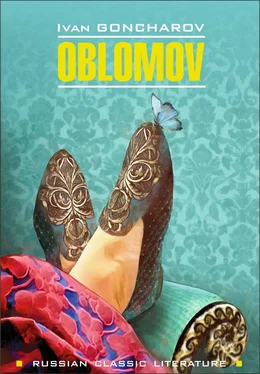All that, of course, happened because Zakhar had been brought up and acquired his manners not in the dark and narrow, but fastidiously furnished, drawing-rooms and studies, cluttered up with all sorts of fancy articles, but in the country, where there was plenty of room to move about. There he was accustomed to work without being cramped and to handle things of solid dimensions and massive weight, such as a spade, a crowbar, iron door clamps, and chairs of such size that he could shift them only with difficulty.
Some article, such as a candlestick, a lamp, a transparency, a paper-weight, remained undamaged for three or four years, but as soon as Zakhar picked it up, it broke.
«Oh», he sometimes used to say to Oblomov when this happened, «look, sir, what an extraordinary thing: I just picked it up and it came to pieces in my hands».
Or he said nothing at all, but would put it back secretly and afterwards assured his master that he had broken it himself; and sometimes he excused himself by saying that even an iron article must get broken sooner or later since it could not possibly last for ever. In the first two instances one could still argue with him, but when, driven into a corner, he armed himself with the last argument, every objection was useless and nothing in the world could convince him that he was wrong.
Zakhar had drawn up a definite programme of activity which he never varied, if he could help it. In the morning he set the samovar, cleaned the boots and clothes his master asked for, but not those he did not ask for, though they might be hanging in the wardrobe for ten years. Then he swept – not every day, though – the middle of the room without touching the comers and dusted only the table that had nothing on it, to save himself the trouble of moving anything. After this he considered that he had a right to snooze on the stove or chatter with Anisya in the kitchen or with the servants at the gates. If he was ordered to do something else besides, he did it only reluctantly after long arguments to show that what was asked of him was useless or impossible. It was quite impossible to make him introduce any permanent new item into his programme of daily tasks. If he was told to clean or wash some article, or fetch something or take something away, he carried out the order with his usual growling, but Oblomov could never make him do that regularly and without being told. The next day or the day after he had to be told to do it again with a resumption of the same unpleasant arguments.
In spite of the fact that Zakhar liked to drink and gossip, took Oblomov’s coppers and silver ten-copeck pieces, smashed the crockery and damaged the furniture, and shirked his work, he was nevertheless deeply devoted to his master. He would gladly have jumped into fire or water for him without a moment’s hesitation and without thinking it heroic or worthy of any admiration or reward. He thought it a natural thing, as something that could not be otherwise, or rather he did not think at all, but acted without any reflection. He had no theories on the subject. It never occurred to him to analyse his feelings towards Oblomov; he had not invented them; they had descended to him from his father, his grandfather, his brothers, and the servants among whom he was brought up, and had become part of his flesh and blood. Zakhar would have died instead of his master, since he considered it as his bounden duty, and even without thinking about it he would have rushed to his death just as a dog rushes at a wild beast in the forest, without thinking why it, and not its master, should rush upon it. But if, on the other hand, he had had to keep awake by his master’s bedside all night because his master’s health and even life depended on it, Zakhar would most certainly have fallen asleep.
Outwardly he did not show any servility to his master, he even treated him familiarly and rudely, was angry with him in good earnest over every trifle and even, as already said, told tales about him at the gate; but all this merely pushed into the background for a time, but not by any means diminished, his inborn and intimate feeling of devotion not to Oblomov as such, but to everything that bore the name of Oblomov and that was close, dear, and precious to him. It is possible even that this feeling was opposed to Zakhar’s own opinion of Oblomov personally; it is possible that a close study of his master’s character gave Zakhar a far from flattering opinion of him. Quite probably Zakhar would have objected if the degree of his devotion to Oblomov had been explained to him.
Zakhar loved Oblomovka as a cat loves its attic, a horse its stable, and a dog the kennel in which it has been born and grown up. Within the sphere of this attachment he developed certain personal impressions. For instance, he liked the Oblomov coachman better than the cook, the dairy-maid Varvara better than either of them, and Oblomov himself least of all; but still, the Oblomovka cook was in his eyes better than any other cook in the world, and Oblomov better than all other landowners. He could not stand Taras the butler, but he would not exchange even him for the best man in the world simply because Taras was an Oblomov servant. He treated Oblomov familiarly and rudely just as a medicine-man treats his idol: he dusts it, drops it, sometimes even strikes it in vexation, but nevertheless at heart he is always conscious of the idol’s superiority to himself. The slightest occasion was sufficient to call forth this feeling from the very depths of Zakhar’s soul and make him look at his master with reverence, and sometimes even burst into tears with emotion. He would never dream of regarding any other gentleman as being in any way better than his master – or even equal to his master. And God help any man who dared compare his master to his disadvantage with anyone else!
Zakhar could not help looking down on the gentlemen who came to visit Oblomov; he served them, handed them tea and so on, with a kind of condescension, as though making them feel the honour his master bestowed on them by receiving them. He turned them away rather rudely: «Master’s asleep», he would say, looking the visitor up and down haughtily. Sometimes, instead of telling tales about Oblomov and abusing him, he would extol him immoderately at the shops and the meetings at the gate, and there was no end to his enthusiasm. He would suddenly begin to enumerate his master’s virtues, his intelligence, dexterity, generosity, good nature; and if his master’s fine qualities were not sufficient to merit his panegyrics, he borrowed them from others and declared Oblomov to be a person of high rank, wealth, and extraordinary influence. If he had to put the fear of God into the caretaker, the landlord’s agent, or even the landlord himself, he always threatened them with Oblomov. «You wait», he would say menacingly, «I’ll tell my master and then you’ll catch it». He did not expect there could be a higher authority in the whole world.
Outwardly, however, Oblomov’s relations with Zakhar were always rather hostile. Living together, they got on each other’s nerves. A close, daily intimacy between two people has to be paid for: it requires a great deal of experience of life, logic, and warmth of heart on both sides to enjoy each other’s good qualities without being irritated by each other’s shortcomings and blaming each other for them. Oblomov knew at least one inestimable virtue in Zakhar – his devotion to himself – and was used to it, believing, too, that it couldn’t and shouldn’t be otherwise; but having grown used to the virtue once and for all, he could no longer enjoy it; at the same time, however, he could not, in spite of his indifference to everything, patiently put up with Zakhar’s innumerable shortcomings. If Zakhar, while being greatly devoted to his master, differed from the old-fashioned servants by his modem shortcomings, Oblomov, too, much as he appreciated his servant’s loyalty, differed from the masters of former times in not cherishing the same friendly and almost affectionate feelings towards Zakhar that they had had for their servants. Occasionally, indeed, he had rows with Zakhar.
Читать дальше












